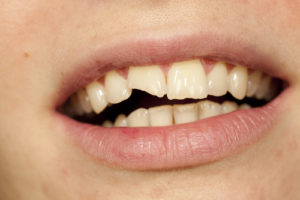 When a chipped tooth strikes, don’t panic! We know it’s hard to keep your calm (especially if you’re in public or – worse – on a date), but there’s help ahead. Chipped teeth are a common concern for patients of all ages and dental histories. Your dentist will consider every aspect of your health before recommending a treatment option that’s a perfect fit. Learn more about why your tooth may have chipped, what your treatment may entail, and how to take the first steps toward a restored smile. We’ve covered everything you need to know below.
When a chipped tooth strikes, don’t panic! We know it’s hard to keep your calm (especially if you’re in public or – worse – on a date), but there’s help ahead. Chipped teeth are a common concern for patients of all ages and dental histories. Your dentist will consider every aspect of your health before recommending a treatment option that’s a perfect fit. Learn more about why your tooth may have chipped, what your treatment may entail, and how to take the first steps toward a restored smile. We’ve covered everything you need to know below.
Common Causes of Cracked, Chipped, or Broken Teeth
Your enamel is the strongest part of your body. But it’s not totally impenetrable – and ongoing damage (like grinding) can weaken enamel and make it susceptible. Some of the usual causes of a chip, crack, or break include:
- Biting things you shouldn’t – Have a habit of chewing on ice or biting your pen when concentrating? Now is the time to stop. These objects are too hard for enamel to encounter safely.
- Dangerous foods – Some foods are dangerous for teeth, and should be eaten carefully and not too often. The American Dental Association says that the most problematic foods and drinks include hard candies, ice, coffee, dried fruit, citrus, potato chips, soda, and sports drinks. Some of those are harmful to teeth for their acidity, not their strength, but all should be moderated.
- Cavities – As decay progresses, it weakens the tooth and makes the enamel susceptible to structural damage.
- Aging dental work – Fillings, bonding, veneers, crowns, and other restorations have lifespans – they won’t last forever. Proper care will extend their lives, but they will still need to be replaced at some point. Older dental work is more likely to crack, especially if it’s been under stress.
- Injury – If you take a blow to the mouth on the field, you may experience tooth or jaw damage. Be sure to wear a mouth guard when partaking in contact sports.
- Bruxism – Chronic clenching and grinding places undue pressure on the enamel and heightens your risk of a dental emergency. Learn more about night guards if you’re waking up with headaches and a sore jaw.
Types of Cracked Teeth: Minor vs. Serious
- Craze lines – Tiny cracks that only impact the outer enamel. Common in adult teeth and merely cosmetic.
- Fractured cusp – A break in the tooth’s chewing surface. Typically painless or minimally painful. Should be repaired to protect the tooth.
- Cracked tooth – A crack extends from the chewing surface down toward the root. Early treatment is crucial to prevent more serious problems.
- Split tooth – A crack that bisects separated segments of the tooth. Develops when a cracked tooth is left untreated and should be treated immediately – the tooth can’t be saved intact, although some portion may be saved.
- Vertical root fracture – Crack that begins in the root and extends up to the chewing surface. Usually not diagnosed until the bone or gums become infected.
Chipped Tooth Treatments
For Superficial Cracks
- Dental bonding – Dental composite is attached to the chipped tooth, rebuilding the missing enamel. Bonding can repair a wide variety of cosmetic concerns, ranging from chips and cracks to persistent stains and gaps between teeth. Bonding typically lasts about ten years. The procedure is comfortable, and anesthesia usually isn’t required (unless cavities are also being filled). Treatment is completed in just one appointment, with the bonding shaped and hardened chairside – you leave the office with your tooth rebuilt. No temporaries or waiting for restorations to return from the dental lab. That said, bonding is less long-lasting than a veneer or crown.
- Veneer – A veneer is a v-shaped cover that is attached to the tooth’s natural surface. Porcelain veneers blend perfectly with surrounding enamel and become a part of your smile. Veneers need to be properly cared for, with protection from grinding and regularly brushing and flossing. But if you give them what they need, they will last for anywhere from 20 to 30 years – no need to worry about ongoing replacement. Veneers take 2 appointments, so you will need to wear a temporary veneer and return to the office for final placement. The natural tooth is prepared so that the veneer doesn’t look bulky or false in any way. Ideal veneer patients are interested in longer-term restoration and the height of aesthetics.
- Crown – A cap that fits over a damaged tooth to cover it completely. Crowns are recommended for patients who have suffered deeper tooth damage. A crown will protect the tooth in question and prevent further cracking. If you need to receive a root canal to treat a cracked tooth, a crown will be placed afterwards to help the tooth stand strong. Like veneers, crowns require two appointments and a waiting period. We also offer same-day CEREC crowns for those interested in accelerated treatment.
For Deeper Cracks and Damage
- Root canal – A root canal removes infected tooth pulp to heal the tooth and seal it off from further infection or damage. If you have experienced a deep crack, a root canal may be necessary to allow you to keep the tooth. This is commonly necessary for patients with cracks that extend into the tooth pulp. You will be completely numb during your root canal and will not experience pain during the procedure. After healing, that tooth will no longer cause pain – its nerves have been removed. You’ll be ready for a crown and you won’t need an extraction to stop the spread of infection.
- Dental implant – In some cases, it may be necessary for the tooth to be extracted. This is the case if the crack extends below the gum line. After an extraction, you can receive a dental implant to accompany a freestanding restoration. An implant connects with your jaw bone to create a strong foundation for a crown, bridge, or partial. There is an extended healing process involved, but then the dental implant will remain in place for decades (or even for life).
When to Visit the Dentist for Tooth Damage
When you notice that something is wrong, give us a call. You know your teeth and gums better than anyone, and any sudden change merits examination. We may be able to reduce the extent of your restorative treatment with early intervention. Use that as your motivation, especially if you have dental anxiety: the earlier you visit, the simpler the treatment plan.o
Macomb Chipped Tooth Treatment | Chipped Tooth Macomb County | Dental Bonding Macomb
Related Articles
Invisalign is an amazing tool that can transform your smile with relative ease and without your treatment being noticeable. However, successful Invisalign treatment not only means sticking to your treatment...
Many people say they "hate the dentist." Don't worry, we know you don't hate us! You just hate the idea of lengthy, painful, stress-inducing dental treatments. Dental anxiety is probably...
Eating healthy every day can be a real challenge, especially when you realize the importance of getting in all of the vitamins, minerals, and other nutrients you need for your...

 When a chipped tooth strikes, don’t panic! We know it’s hard to keep your calm (especially if you’re in public or – worse – on a date), but there’s help ahead. Chipped teeth are a common concern for patients of all ages and dental histories. Your dentist will consider every aspect of your health before recommending a treatment option that’s a perfect fit. Learn more about why your tooth may have chipped, what your treatment may entail, and how to take the
When a chipped tooth strikes, don’t panic! We know it’s hard to keep your calm (especially if you’re in public or – worse – on a date), but there’s help ahead. Chipped teeth are a common concern for patients of all ages and dental histories. Your dentist will consider every aspect of your health before recommending a treatment option that’s a perfect fit. Learn more about why your tooth may have chipped, what your treatment may entail, and how to take the 

